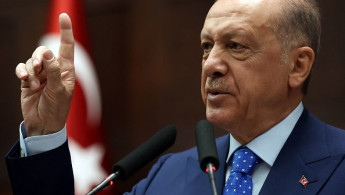Turkey's Erdogan still against Finnish, Swedish NATO bids
Turkey’s president has told journalists he still intends to block Finland and Sweden’s accession to NATO.
Recep Tayyip Erdogan said meetings this week with Finnish and Swedish delegations had not been “at the expected level,” noting there had been no steps taken to alleviate Turkey’s security concerns.
“As long as Tayyip Erdogan is at the head of the Republic of Turkey, we cannot say ‘yes’ to countries that support terror joining NATO,” he told journalists on his plane following a visit to Azerbaijan Saturday, according to the daily Hurriyet newspaper.
Erdogan referred to an interview on Swedish state television with Salih Muslim, a member of the Syrian Kurdish administration in northeast Syria, on the night of the delegation meeting. He cited this as evidence of Sweden’s support for Syrian Kurdish militants that Turkey views as an extension of an outlawed Kurdish group that has led an insurgency against Turkey since 1984.
“They are not honest or genuine,” Erdogan said and vowed to not allow countries that “nuzzle terrorists to their bosom, feed terrorists on their laps.” He also accused Germany, France and the Netherlands of committing the same “mistake” of supporting terror.
The Syrian Kurdish People's Protection Units, or YPG, forms the backbone of U.S.-led forces in the fight against the Islamic State group. Turkey has been fighting the Kurdistan Workers' Party, or PKK, since 1984 inside Turkey and northern Iraq, where it has stepped up its operations. Ankara has also led cross-border operations into Syria to push the YPG away from its border, saying they are one and the same as the PKK.
All NATO members must approve the two Nordic nations' historic bid to join the alliance, propelled by alarm at Russia's invasion of Ukraine. Turkey, which commands the second largest army in the alliance, has said it won't allow their accession unless steps are taken, including a lifting of restrictions on weapons sales to Turkey.
Erdogan added he would be speaking by phone with Russian and Ukrainian leaders on Monday.





 Follow the Middle East's top stories in English at The New Arab on Google News
Follow the Middle East's top stories in English at The New Arab on Google News
![The UAE is widely suspected of arming the RSF militia [Getty]](/sites/default/files/styles/image_330x185/public/2024-11/GettyImages-472529908.jpg?h=69f2b9d0&itok=Yauw3YTG)
![Netanyahu furiously denounced the ICC [Getty]](/sites/default/files/styles/image_330x185/public/2024-11/GettyImages-2169352575.jpg?h=199d8c1f&itok=-vRiruf5)
![Both Hamas and the Palestinian Authority welcomed the ICC arrest warrants [Getty]](/sites/default/files/styles/image_330x185/public/2024-11/GettyImages-2178351173.jpg?h=199d8c1f&itok=TV858iVg)